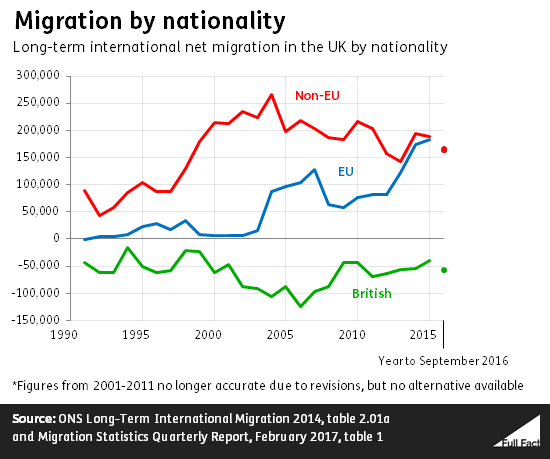“Net migration to UK falls to 273,000”
BBC News, 23 February 2017
“THE BREXIT EFFECT? Migration to the UK has DROPPED in the quarter after Britain voted to leave the European Union – to the lowest level in two years”
The Sun, 23 February 2017
“Net migration to UK falls by 49,000 after Brexit vote”
The Guardian, 23 February 2017
If you’ve seen headlines this morning claiming net migration has fallen by 49,000 to 273,000 in the year to last September, and anything linking this with the EU referendum, you need to tread carefully when drawing conclusions about them. ‘Net migration’ is the difference between the number of people coming to live in the UK and the number of people leaving to live abroad.
The change looks big, but it isn’t actually “statistically significant”. In other words, we can’t be sure enough that the change isn’t just down to random variation, as opposed to something genuine. That’s because all these numbers come out of a survey of passengers at ports across the UK, so they can’t precisely count everyone in and out. Uncertainty is inevitable.
That said, given the scale of the measured fall there’s still a good chance that we’re seeing something genuine.
Within the EU there is a mixed picture, with a fall in net migration of Eastern Europeans but a rise in immigration by Bulgarians and Romanians.
Few significant changes but lots of food for thought
Behind the headline decreases there were also falls in net migration from the rest of the EU and outside the EU as well. Again, these weren’t big enough to be significant but do potentially mark the start of genuine decreases.
But there were some changes we can be reasonably sure about:
- Up: Immigration of Romanian and Bulgarian citizens to the UK.
- Up: Emigration of citizens of eight Eastern European countries which joined the EU in 2004 from the UK.
- Up: Emigration of African, American and Oceanian citizens from the UK.
- Down: Immigration of people arriving to study, mainly from outside the EU. It is too early to tell if this is “an emerging long-term trend”, the Office for National Statistics said.
Too soon to say what effect the EU referendum has had
This is the first set of estimates we’ve had covering the months following last year’s EU referendum. But as the ONS points out this morning:
“it is too early to say what effect the referendum result has had on long-term international migration”
Part of that is because there hasn’t been a consistent picture of EU immigration and emigration. Net migration from Eastern Europe was estimated to have fallen slightly, while there were significant increases in Romanian and Bulgarian immigrants.
